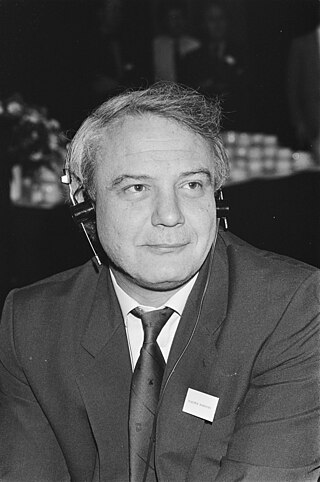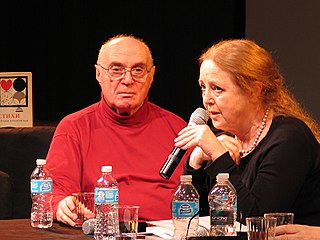Glasnost is a concept relating to openness and transparency. It has several general and specific meanings, including a policy of maximum openness in the activities of state institutions and freedom of information and the inadmissibility of hushing up problems. In Russian, the word glasnost has long been used to mean 'openness' and 'transparency'. In the mid-1980s, it was popularised by Mikhail Gorbachev as a political slogan for increased government transparency in the Soviet Union within the framework of perestroika, and the calque of the word entered into English in the latter meaning.

Human rights in the Soviet Union were severely limited. The Soviet Union was a totalitarian state from 1927 until 1953 and a one-party state until 1990. Freedom of speech was suppressed and dissent was punished. Independent political activities were not tolerated, whether they involved participation in free labor unions, private corporations, independent churches or opposition political parties. The citizens' freedom of movement was limited both inside and outside the country.

Vladimir Konstantinovich Bukovsky was a Soviet and Russian human rights activist and writer. From the late 1950s to the mid-1970s, he was a prominent figure in the Soviet dissident movement, well known at home and abroad. He spent a total of twelve years in the psychiatric prison-hospitals, labour camps, and prisons of the Soviet Union during Brezhnev rule.
Petro Grigorenko or Petro Hryhorovych Hryhorenko was a high-ranking Soviet Army commander of Ukrainian descent, who in his fifties became a dissident and a writer, one of the founders of the human rights movement in the Soviet Union.

A Chronicle of Current Events was one of the longest running samizdat periodicals of the post-Stalinist Soviet Union. This unofficial newsletter reported violations of civil rights and judicial procedure by the Soviet government and responses to those violations by citizens across the Soviet Union. Appearing first in April 1968, it soon became the main voice of the Soviet human rights movement, inside the country and abroad.

Pavel Mikhailovich Litvinov is a Russian-born U.S. physicist, writer, teacher, human rights activist and former Soviet-era dissident.
Soviet dissidents were people who disagreed with certain features of Soviet ideology or with its entirety and who were willing to speak out against them. The term dissident was used in the Soviet Union (USSR) in the period from the mid-1960s until the Fall of Communism. It was used to refer to small groups of marginalized intellectuals whose challenges, from modest to radical to the Soviet regime, met protection and encouragement from correspondents, and typically criminal prosecution or other forms of silencing by the authorities. Following the etymology of the term, a dissident is considered to "sit apart" from the regime. As dissenters began self-identifying as dissidents, the term came to refer to an individual whose non-conformism was perceived to be for the good of a society. The most influential subset of the dissidents is known as the Soviet human rights movement.

Dina Isaakovna Kaminskaya was a lawyer and human rights activist in the Soviet Union who was forced to emigrate in 1977 to avoid arrest. She and her husband moved to the United States. She was born to Jewish family in Yekaterinoslav.

Anatoly Tikhonovich Marchenko was a Soviet dissident, author, and human rights campaigner, who became one of the first two recipients of the Sakharov Prize for Freedom of Thought of the European Parliament when it was awarded to him posthumously in 1988.

Lyudmila Mikhaylovna Alexeyeva was a Russian historian and human-rights activist who was a founding member in 1976 of the Moscow Helsinki Watch Group and one of the last Soviet dissidents active in post-Soviet Russia.

Victor Aleksandrovich Krasin was a Russian human rights activist, economist, a former Soviet dissident and a political prisoner. At the time of his death Krasin was a US citizen.

Sergei Adamovich Kovalyov was a Russian human rights activist and politician. During the Soviet period he was a dissident and, after 1975, a political prisoner.
The Committee on Human Rights in the USSR was founded in 1970 by dissident Valery Chalidze together with Andrei Sakharov and Andrei Tverdokhlebov.

Arseny Borisovich Roginsky was a Soviet dissident and Russian historian. He was one of the founders of the International Historical and Civil Rights Society Memorial, and its head since 1998.
Andrei Nikolayevich Tverdokhlebov was a Soviet physicist, dissident and human rights activist. In 1970, he founded - along with Valery Chalidze and Andrei Sakharov - the Committee on Human Rights in the USSR. In 1973, Tverdokhlebov - along with Valentin Turchin - founded the first chapter of Amnesty International in the Soviet Union. He also helped found Group 73, a human rights organization that helped political prisoners in the Soviet Union. He was the author/editor of several samizdat publications while in the Soviet Union, which were compiled in the book, "In Defense of Human Rights", published by Khronika Press, New York, in 1975.
The glasnost meeting, also known as the glasnost rally, was the first spontaneous public political demonstration in the Soviet Union after the Second World War. It took place in Moscow on 5 December 1965 as a response to the trial of writers Andrei Sinyavsky and Yuli Daniel. The demonstration is considered to mark the beginning of a movement for civil rights in the Soviet Union.
The Initiative or Action Group for the Defense of Human Rights in the USSR was the first civic organization of the Soviet human rights movement. Founded in 1969 by 15 dissidents, the unsanctioned group functioned for over six years as a public platform for Soviet dissidents concerned with violations of human rights in the Soviet Union.
In 1965 a human rights movement emerged in the USSR. Those actively involved did not share a single set of beliefs. Many wanted a variety of civil rights — freedom of expression, of religious belief, of national self-determination. To some it was crucial to provide a truthful record of what was happening in the country, not the heavily censored version provided in official media outlets. Others still were "reform Communists" who thought it possible to change the Soviet system for the better.
The Trial of the Four, also Galanskov–Ginzburg trial, was the 1968 trial of Yuri Galanskov, Alexander Ginzburg, Alexey Dobrovolsky and Vera Lahkova for their involvement in samizdat publications. The trial took place in Moscow City Court on January 8–12. All four defendants were sentenced to terms in labour camps. The trial played a major part in consolidating the emerging human rights movement in the Soviet Union.
Marjorie Milne Farquharson was a political scientist and human rights worker.










